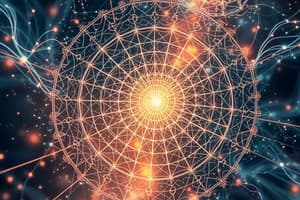Podcast
Questions and Answers
What is a common way in which theorists contribute to modern physics research?
What is a common way in which theorists contribute to modern physics research?
- Conducting large-scale experiments
- Managing enormous data sets
- Fine-tuning their models using experimental data (correct)
- Developing sophisticated algorithms
Which group in modern physics research often faces the challenge of managing enormous data sets?
Which group in modern physics research often faces the challenge of managing enormous data sets?
- Computational physicists (correct)
- Experimentalists
- Theorists
- Undergraduate students
What is a common reward for modern physicists according to the text?
What is a common reward for modern physicists according to the text?
- Avoiding collaboration with other physicists
- Working on large-scale projects
- Solving specific problems with limited scope
- Contributing to the advancement of our understanding of the universe (correct)
What is a potential opportunity for undergraduates interested in modern physics research?
What is a potential opportunity for undergraduates interested in modern physics research?
How do experimentalists benefit from theoretical predictions in modern physics research?
How do experimentalists benefit from theoretical predictions in modern physics research?
What is the primary focus of theoretical physics?
What is the primary focus of theoretical physics?
Which type of physicist constructs and operates instrumentation to test theoretical predictions?
Which type of physicist constructs and operates instrumentation to test theoretical predictions?
What is a potential challenge faced by computational physicists in modern physics research?
What is a potential challenge faced by computational physicists in modern physics research?
In which subfield of physics are numerical analysis and computational techniques commonly employed?
In which subfield of physics are numerical analysis and computational techniques commonly employed?
What distinguishes applied physics from pure physics research?
What distinguishes applied physics from pure physics research?
Which physicists explore fundamental principles beyond traditional theories?
Which physicists explore fundamental principles beyond traditional theories?
What is a key aspect of experimental physics?
What is a key aspect of experimental physics?
Flashcards are hidden until you start studying
Study Notes
Modern Physics: Exploring Beyond Traditional Boundaries
Modern physics, a vast and ever-expanding discipline, goes beyond traditional theories to explore the fundamental principles and phenomena of the universe. This article will delve into the subtopics of modern physics, including theory, experiment, computation, and their intersections.
Theory
Theorists use mathematics to explain current phenomena, predict new ones, and describe the laws of the universe. Theoretical physics often employs models and abstract concepts, which can be applied to a wide range of phenomena, from the tiniest particles to the largest cosmic structures.
Experiment
Experimental physicists test theoretical predictions and investigate observable interactions and physical behavior. They construct and operate instrumentation of various scales, from small devices that fit in a lab to massive facilities like the Large Hadron Collider.
Computation
Computational physicists apply numerical analysis and other computational techniques to physics problems. This subfield is increasingly becoming a field unto itself, with applications to large-scale weather simulations, investigations of the properties of semiconductors, or models of protein folding.
Applied Physics
Applied physicists apply physics principles to practical situations, like medical physics or engineering. This subdiscipline of physics differs from "pure physics" research because it is being applied in real-time for practical use.
Intersections of Modern Physics
Theorists, experimentalists, and computational physicists often collaborate closely to advance our understanding of the universe. Theorists may use experimental data to fine-tune their models, while experimentalists rely on theoretical predictions to guide their research. Computational physicists contribute by modeling and simulating complex systems.
Challenges and Rewards
Modern physics research can be challenging and rewarding. Theorists may tackle specific problems with limited scope, while experimentalists often work on large-scale projects. Computational physicists face the challenge of managing enormous data sets and developing sophisticated algorithms. Regardless of the subfield, modern physicists enjoy the satisfaction of discovering new knowledge and contributing to the advancement of our understanding of the universe.
Opportunities for Undergraduates
Undergraduate students looking to get involved in modern physics research may encounter challenges in finding opportunities, but they can still succeed. Some universities offer research experiences to undergraduates, and some faculty members are willing to supervise undergraduates. Undergraduates may also seek out research assistant positions, which can provide valuable experience and help them establish themselves in the field.
Conclusion
Modern physics continues to expand our understanding of the universe and its fundamental principles. Theorists, experimentalists, and computational physicists work together to advance our understanding of the universe and its constituents. Undergraduates looking to get involved in this exciting field can find opportunities and build valuable skills through research experiences and research assistant positions.
Studying That Suits You
Use AI to generate personalized quizzes and flashcards to suit your learning preferences.





